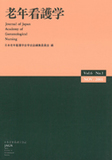Japanese
English
- 販売していません
- Abstract 文献概要
- 参考文献 Reference
本研究は,痴呆ケア経験年数3年以上の看護・介護職が,痴呆性高齢者の活動性を引き出していると考えられるアクティビティ・プログラム(AP)の介入方法を明らかにすることを目的とする.研究方法は,痴呆ケア経験年数3年以上の看護・介護職18人に半構成質問紙によるインタビューを行い,分析は修正版グラウンデッド・セオリーを用いて行った.
その結果,明らかになったことは,痴呆性高齢者の個別情報をもとに,痴呆性高齢者の個別情報がない場合とある場合の,両方の状態から活動性を引き出す介入方法であった.そして,痴呆性高齢者の個別情報を中心にAP介入方法のモデルを示すことができた.これらの結果を利用することによって,APの決定はプログラムの種類からの選択ではなく,高齢者のニーズを中心に行うことができると考えられる.
The purpose of this study is to clarify the intervention methods by the nurses and caregivers in finding activity programs to draw out activity from the elderly people with dementia. As for the research method, interviews were carried out towards 18 skilled nurses and caregivers in the field of giving care for the elderly suffering from elderly people with dementia by using quasi open-ended type questionnaire sheet, and the analysis was implemented with revised Grounded Theory.
From this study, it was found that there are 2 methods of making intervention by the nurses and caregivers to draw out activity from those elderly people with dementia; one not based on the dates of each of the individual, and the other based on such dates. In addition to this, the models of activity programs could be formulated based on the data of the individual elderly people with dementia. Therefore, it is possible to conclude that the decision-making regarding activity programs can be done, not based on the choices of the available programs but on the needs of the elderly people with dementia.
Copyright © 2001, Japan Academy of Gerontological Nursing All rights reserved.


